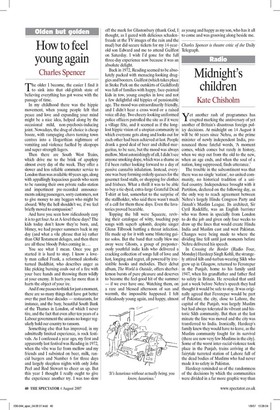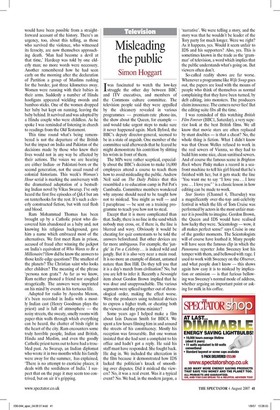Midnight's children
Kate Chisholm yet another rash of programmes has erupted marking the anniversary of yet another of Britain's disastrous foreign policy decisions. At midnight on 14 August it will be 60 years since Nehru, as the prime minister of newly independent India, pronounced those fateful words, 'A moment comes, which comes but rarely in history, when we step out from the old to the new, when an age ends, and when the soul of a nation, long suppressed, finds utterance.'
The trouble in the subcontinent was that there was no single 'nation', no united community, no historical tradition of a unified country. Independence brought with it Partition, declared on the following day, as the only way to reach agreement between Nehru's largely Hindu Congress Party and Jinnah's Muslim League. Its architect, Sir Cyril Radcliffe, was an English barrister who was flown in specially from London to do the job and given only four weeks to draw up the lines that would create Hindu India and Muslim east and west Pakistan. Changes were being made to where the dividing line fell until just moments before Nehru delivered his speech.
In Crossing the Border (Radio Four, Monday) Hardeep Singh Kohli, the strangely attired kilt-and-turban-wearing Sikh who grew up in Glasgow, returned to Ferozepur in the Punjab, home to his family until 1947, when his grandfather and father fled to safety in Britain. He revealed that until just a week before Nehru's speech they had thought it would be safe to stay. It was originally agreed that Ferozepur would be part of Pakistan; the city, close to Lahore, the capital of the Punjab, was largely Muslim but had always tolerated its vibrant and historic Sikh community. But then at the last minute the line was moved and the city was transferred to India. Ironically, Hardeep's family knew they would have to leave, as the Muslim community fought for its survival (there are now very few Muslims in the city). Some of the worst inter-racial violence took place in the Punjab, trains arriving at the fairytale turreted station of Lahore full of the dead bodies of Muslims who had never made it to safety in Pakistan.
Hardeep reminded us of the randomness of the decisions by which the communities were divided in a far more graphic way than would have been possible from a straightforward account of the history. There's an urgency, too, about this telling, as those who survived the violence, who witnessed its ferocity, are now themselves approaching death. 'Man had become a devil at that time,' Hardeep was told by one elderly man; no more words were necessary. Another remembered how he had seen early on the morning after the declaration of Partition a group of Muslims rushing for the border, just three kilometres away. Women were running with their babies in their arms. Suddenly a number of Hindu hooligans appeared wielding swords and bamboo sticks. One of the women dropped her baby but kept on running, leaving the baby behind. It survived and was adopted by a Hindu couple who were childless. As he spoke I was reminded of listening in church to readings from the Old Testament.
This time round what's being remembered is not the departure of the British but the impact on India and Pakistan of the decisions made by those who knew their lives would not in any way be affected by their actions. The voices we are hearing are either Indianor Pakistani-born or the second generation, not the usual round of colonial historians. This week's Woman's Hour serial is marking the anniversary with the dramatised adaptation of a bestselling Indian novel by Vikas Swarup. I've only heard the first five episodes of Q&A but am on tenterhooks for the rest. It's such a cleverly constructed fiction, but with real flesh and blood.
Ram Mohammad Thomas has been brought up by a Catholic priest who discovered him abandoned as a baby and, not knowing his religious background, gave him a name which embraced most of the alternatives. We first meet Ram in prison, accused of fraud after winning the jackpot on India's equivalent of Who Wants to Be a Millionaire? How did he know the answers to those knife-edge questions? The smallest of the planets? The Christian saint who looks after children? The meaning of the phrase 'persona non grata'? As far as we know, Ram neither phoned a friend nor coughed stragetically. The answers were imprinted on his mind by events in his tortuous life.
Adapted for radio by Ayeesha Menon, it's been recorded in India with a mostly Indian cast (Henry Goodman plays the priest) and is full of atmosphere — the noisy streets, the sweaty, smelly rooms with paper-thin walls through which everything can be heard, the chatter of birds right in the heart of the city. Ram encounters some truly horrible people, Indian and British, Hindu and Muslim, and even the goodly Catholic priest turns out to have had a troubled past. As Swarup, an Indian diplomat who wrote it in two months while his family were away for the summer, has explained, 'There is no attempt to exoticise places; it deals with the sordidness of India.' I suspect that on the page it may seem too contrived, but on air it's gripping.









































 Previous page
Previous page